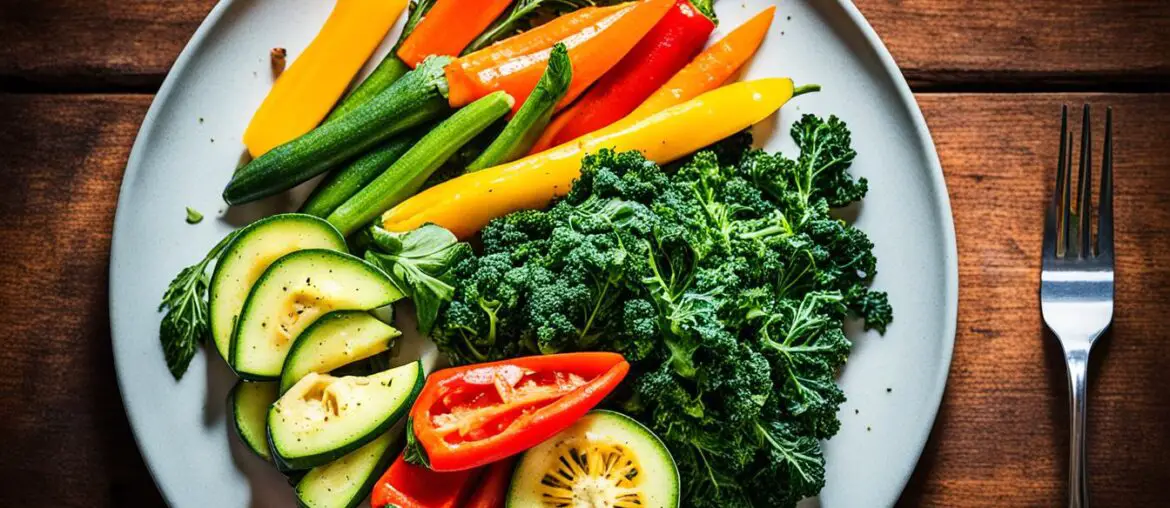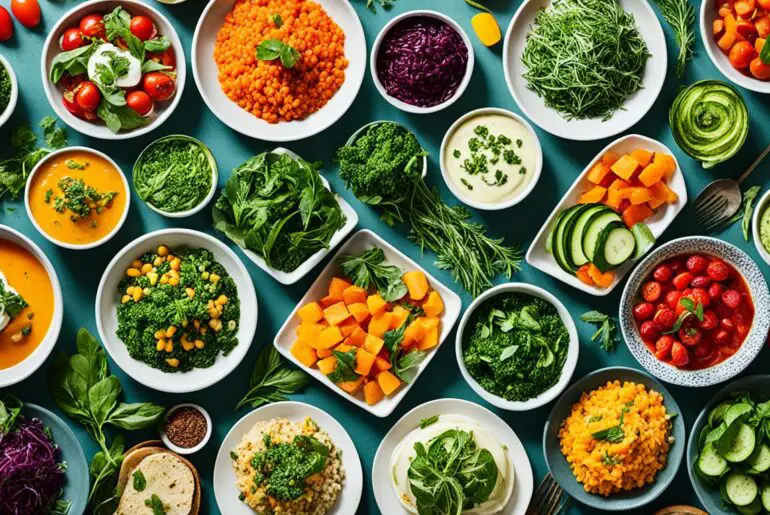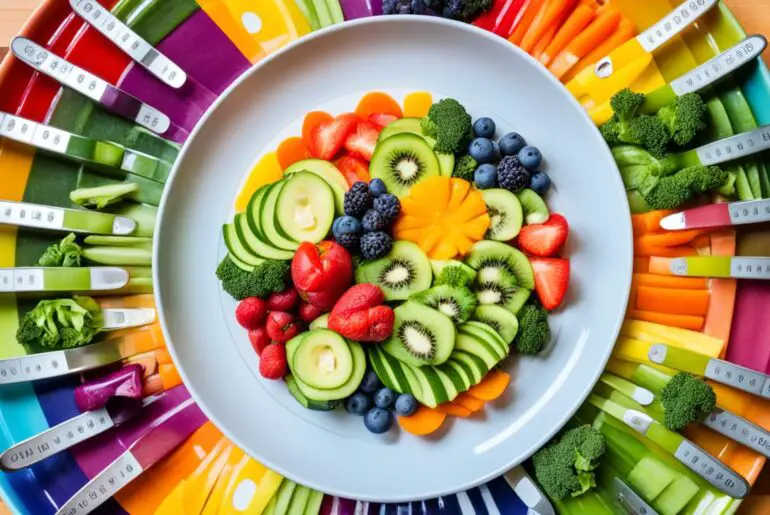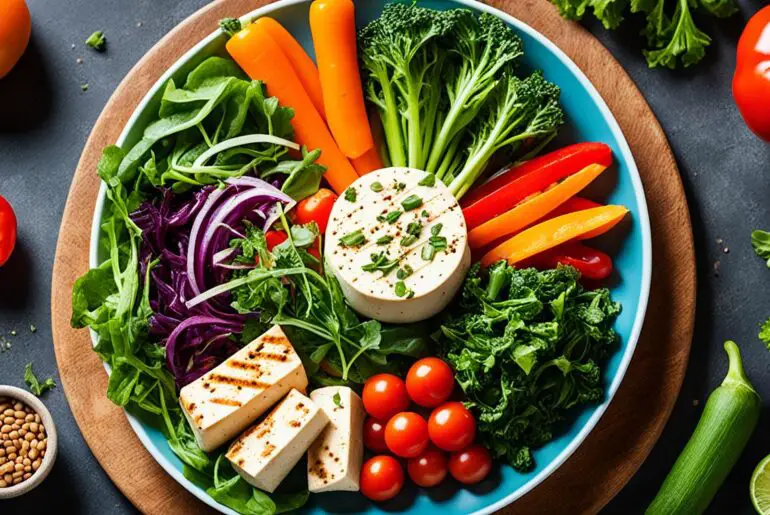Are you a vegetarian looking to lose weight? Contrary to popular belief, vegetarians can also achieve successful weight loss on the HCG diet. By making simple substitutions and following a strict meal plan, you can shed those extra pounds without compromising your dietary preferences.
Many people assume that the HCG diet, which emphasizes the consumption of meat, is not suitable for vegetarians. However, with the right knowledge and strategies, vegetarians can adapt the HCG diet to their needs and achieve rapid weight loss results.
In this article, I will guide you through the world of quick, delicious, and vegetarian-friendly HCG diet meals. By incorporating high-protein substitutes and following the proper nutritional plan, you can experience the benefits of the HCG diet and achieve your weight loss goals as a vegetarian.
Key Takeaways:
- Vegetarians can lose weight on the HCG diet through simple substitutions.
- Protein intake is crucial for weight loss on the HCG diet.
- Vegetarian protein sources, such as tofu and eggs, can be used as replacements.
- Following a strict meal plan and including probiotics can enhance weight loss results.
Can Vegetarians Do the HCG Diet?
The HCG diet is commonly associated with a high-protein, low-carbohydrate meal plan that includes lean meats like chicken and beef. However, vegetarians and vegans can also follow the HCG diet by making suitable modifications to their meal plan. Let’s explore how vegetarians can adapt the HCG diet to meet their dietary preferences and achieve their weight loss goals.
There are different types of vegetarian diets, including Lacto-Ovo vegetarians who include eggs and dairy products in their meals, and Lacto-Vegetarians who consume dairy products but exclude eggs. These individuals can incorporate these animal-based proteins into their HCG diet meal plans.
For vegetarians on the HCG diet who do not consume eggs or dairy products, finding suitable meat protein replacements is essential. While other vegetarian-friendly protein sources like nuts and legumes are typically part of a vegetarian diet, they are not recommended on the HCG diet due to their higher fat and calorie content. However, organic milk can be used as a substitute for animal protein.
It is crucial for vegetarians on the HCG diet to prioritize their protein intake through alternative sources. Some protein-rich vegetarian options to consider include:
Vegetarian Protein Options for the HCG Diet:
- Cottage cheese
- Tofu
- Tempeh
- Miso soup
- Eggs
These protein sources not only provide adequate protein but also help in maintaining a sense of fullness and satiety. By incorporating these alternatives into their meal plans, vegetarians can stay on track with the HCG diet while enjoying delicious and nourishing meals.
Next, we will explore high-protein alternatives specifically tailored for vegetarians on the HCG diet.
High-Protein Alternatives for Vegetarians on the HCG Diet
As a vegetarian following the HCG diet, maintaining adequate protein intake is essential for effective weight loss. Fortunately, there are plenty of high-protein alternatives that align with the HCG diet’s calorie restrictions and provide the necessary nutrition. By incorporating these protein-rich options into your vegetarian HCG diet meal plan, you can stay on track and achieve your weight loss goals.
Cottage Cheese
One excellent source of protein for vegetarians on the HCG diet is cottage cheese. With approximately 28 grams of protein per cup, cottage cheese offers a substantial amount of protein while remaining low in calories. It can be enjoyed on its own or used as a base for various healthy vegetarian recipes, such as cottage cheese pancakes or a protein-packed salad.
Tofu
Tofu, made from soybean curds, is another versatile and protein-rich option for vegetarians on the HCG diet. With approximately 20 grams of protein per cup, tofu can be incorporated into stir-fries, tofu scrambles, or even blended into smoothies for a protein boost. Experiment with different tofu recipes to keep your meals exciting and satisfying.
Legumes
Legumes, such as soy-based products like miso, provide an excellent source of protein for vegetarians on the HCG diet. Miso soup, for example, is a flavorful and protein-packed option that can be enjoyed as a part of your meal plan. However, it’s important to note that other legumes, such as beans and lentils, are higher in fat and calorie content, so they should be avoided on the HCG diet.
Eggs
Eggs are a convenient and nutritious protein source that can be incorporated into various vegetarian HCG diet meal ideas. With approximately 6 grams of protein per egg, they are an excellent option to include in your diet. Whether enjoyed as a boiled egg, scrambled, or used in omelets, eggs provide a satisfying protein boost while keeping your meals interesting and diverse.
By incorporating these high-protein alternatives into your vegetarian HCG diet meal plan, you can ensure that you’re meeting your protein needs while adhering to the calorie restrictions of the diet. Experiment with different recipes and stay creative with your meal choices to keep your diet enjoyable and sustainable.
Stay tuned for more healthy vegetarian recipes and valuable tips to support your vegetarian HCG diet journey!
Phases of the Vegetarian HCG Diet
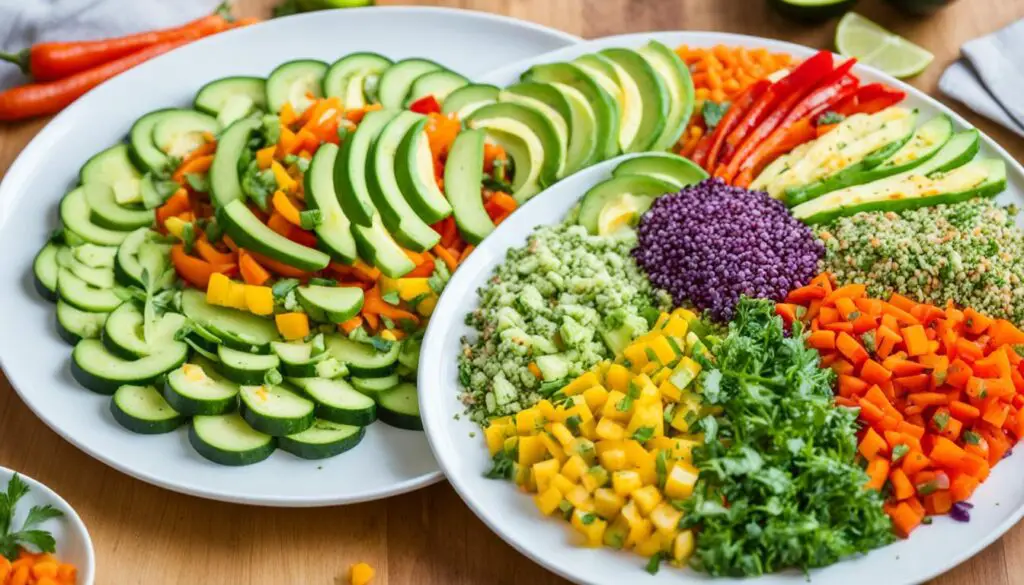
The vegetarian HCG diet consists of three main phases: the loading phase, the weight loss phase, and the maintenance phase. Each phase plays a crucial role in the overall success of the diet and helps individuals achieve their desired weight loss goals.
Loading Phase
The loading phase of the vegetarian HCG diet lasts for 48 hours and is designed to build up fat stores in the body. During this phase, individuals consume calorie-dense foods to prepare their bodies for the upcoming weight loss phase. While it may seem counterintuitive to consume high-calorie foods at the beginning, this phase helps kickstart the metabolism and ensures a steady energy supply throughout the diet.
Weight Loss Phase
The weight loss phase is the main component of the vegetarian HCG diet and typically lasts between three to six weeks. During this phase, individuals follow a low-calorie diet, limiting their daily caloric intake to 500-1200 calories. The key is to choose easy vegetarian meals that are nutrient-dense and provide all the necessary vitamins and minerals while still adhering to the calorie restrictions. Additionally, individuals continue with HCG injections to support weight loss and suppress appetite.
Maintenance Phase
The maintenance phase is the final phase of the vegetarian HCG diet and allows for some flexibility in food choices. It is crucial to transition gradually from the low-calorie diet to a more sustainable eating plan. During this phase, individuals can reintroduce foods like legumes and full-fat organic dairy products while still maintaining portion control and making healthy choices. This phase helps individuals maintain their weight loss results and establish long-term healthy eating habits.
Phases of the Vegetarian HCG Diet
| Phase | Duration | Description |
|---|---|---|
| Loading Phase | 48 hours | Consuming high-calorie foods to build up fat stores |
| Weight Loss Phase | 3-6 weeks | Following a low-calorie diet and continuing with HCG injections |
| Maintenance Phase | Ongoing | Transitioning to a more sustainable eating plan with flexibility in food choices |
Vegetarian HCG Diet Meal Plan
The vegetarian HCG diet meal plan is designed to provide a balanced and nutritious eating plan for vegetarians on the HCG diet. By incorporating two servings of fruit, two servings of vegetables, and one serving of protein, vegetarians can achieve their weight loss goals while following a vegetarian lifestyle.
Here is a breakdown of the vegetarian HCG diet meal plan:
- Fruits: Include two servings of fruits in your daily meals. Choose from a variety of options such as guava, avocado, orange, fig, and mango. These fruits are not only delicious but also provide essential vitamins and minerals to support your overall health.
- Vegetables: Consume two servings of vegetables per day. Some recommended vegetable options include spinach, tomatoes, celery, onions, cucumbers, lettuce, and cabbage. These vegetables are rich in fiber and nutrients that contribute to a healthy diet.
- Protein: Incorporate one serving of protein in every meal. Choose from vegetarian protein sources such as protein powder, eggs, or tofu. These options provide the necessary protein to meet your daily requirements and support muscle growth and maintenance.
- Beverages: Stay hydrated by drinking tea, coffee, and water throughout the day. These beverages are allowed on the HCG diet and can help you maintain your fluid balance and support overall well-being.
The vegetarian HCG diet meal plan emphasizes variety and encourages the use of approved HCG salad dressings to add flavor to your meals. It is important to follow the meal plan and maintain the recommended calorie intake outlined in the HCG diet guidelines to achieve maximum weight loss results.
Following this meal plan, vegetarians on the HCG diet can enjoy quick weight loss while still enjoying delicious and nutritious meals.
Essential Groceries for the Vegetarian HCG Diet
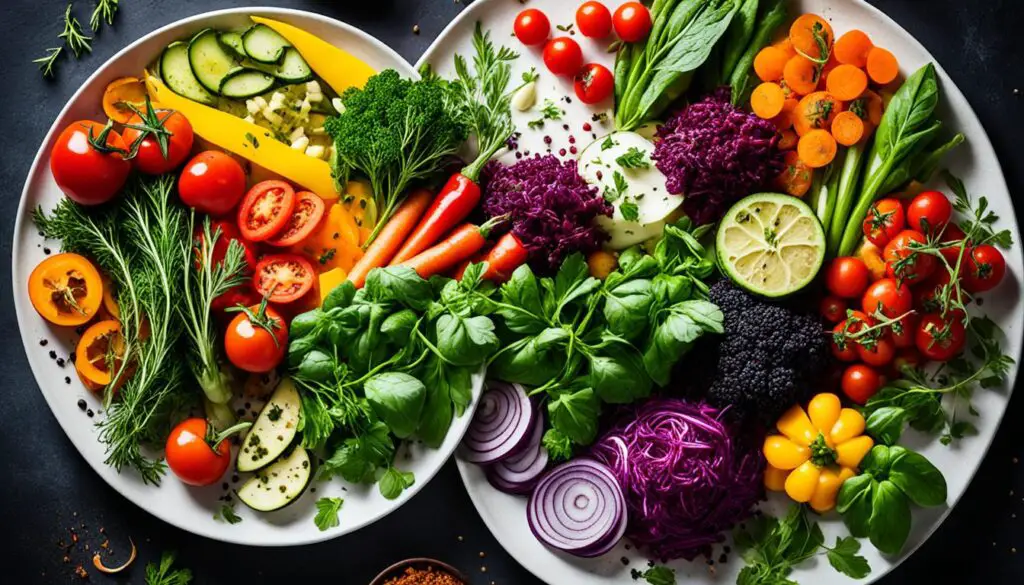
When following the vegetarian HCG diet, it’s important to stock up on essential groceries that align with the guidelines of the diet. These groceries should provide the necessary nutrients while keeping the fat and calorie content low. Here are some high-protein alternatives that are perfect for vegetarians on the HCG diet:
- Cottage Cheese: Cottage cheese is a versatile and protein-rich option for vegetarians on the HCG diet. It can be included in salads, smoothies, or eaten as a snack.
- Tofu: Tofu is a popular meat substitute that is high in protein and low in calories. It can be used in stir-fries, soups, or as a main course in vegetarian dishes.
- Legumes: Soy-based products like miso soup or tempeh are excellent sources of plant-based protein for vegetarians on the HCG diet. They can be incorporated into soups, stews, or stir-fries.
- Eggs: Eggs are a versatile protein option for vegetarians. They can be boiled, scrambled, or used in omelets to add protein to your meals.
By including these essential groceries in your vegetarian HCG diet, you can ensure that you’re getting the necessary protein while adhering to the diet’s guidelines. Remember to choose nutritious options and experiment with different recipes to keep your meals interesting and satisfying.
Benefits of Essential Groceries on the Vegetarian HCG Diet
Choosing the right groceries is crucial for success on the vegetarian HCG diet. Incorporating high-protein alternatives like cottage cheese, tofu, legumes, and eggs provides the necessary nutrients while helping to support weight loss. These options are low in fat and calories, making them ideal choices for vegetarians looking to shed pounds.
What Can You Eat on the Vegetarian HCG Diet?
https://www.youtube.com/watch?v=9UPJrpPLMFg
When following the vegetarian HCG diet, it’s important to choose the right foods that promote weight loss and provide essential nutrients. The diet consists of a carefully planned meal plan that includes a variety of vegetarian options to keep you satisfied and on track with your weight loss goals.
The vegetarian HCG diet meal plan includes:
- One serving of protein: Protein is an essential component of the vegetarian HCG diet as it helps preserve muscle mass and keeps you feeling full. Choose from options such as protein powder, eggs, or tofu.
- One serving of vegetables: Vegetables are low in calories and rich in vitamins, minerals, and fiber. Opt for vegetables like spinach, tomatoes, celery, onions, cucumbers, lettuce, and cabbage to add variety and nutrients to your meals.
- One serving of fruit: Fruits provide natural sugars and additional vitamins and minerals. Include fruits like guava, avocado, orange, fig, and mango in your diet to satisfy your sweet cravings.
In addition to these food groups, you can enjoy a range of beverages while on the vegetarian HCG diet. Stay hydrated with mineral water, and enjoy the refreshing flavors of tea, coffee, and lemon juice.
Remember, portion sizes are crucial on the HCG diet. Stick to the prescribed portion sizes and follow the meal plan to ensure successful weight loss and maintain a balanced diet.
| Food Group | Examples |
|---|---|
| Protein | Protein powder, eggs, tofu |
| Vegetables | Spinach, tomatoes, celery, onions, cucumbers, lettuce, cabbage |
| Fruit | Guava, avocado, orange, fig, mango |
| Beverages | Mineral water, tea, coffee, lemon juice |
After the Vegetarian HCG Diet
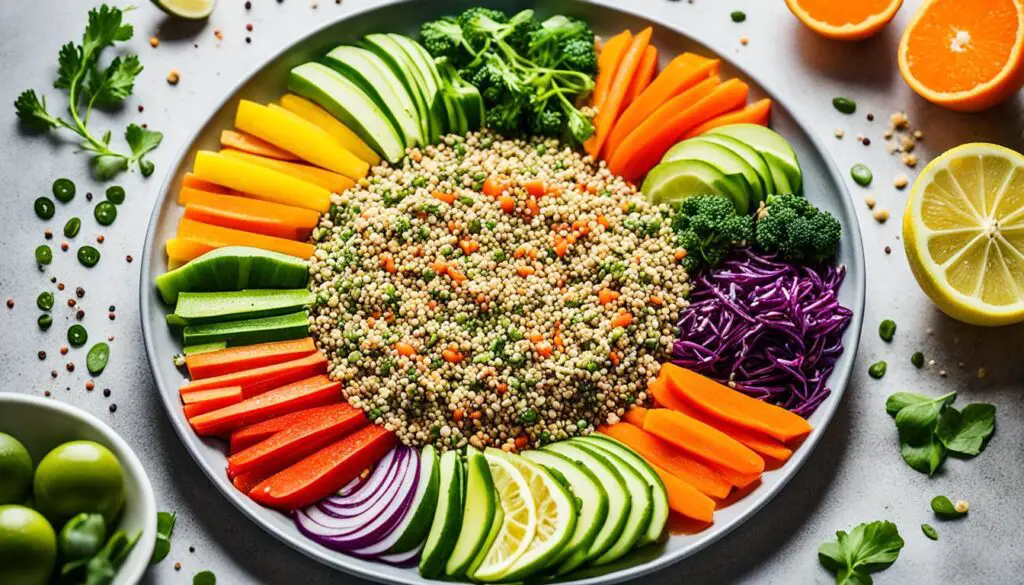
After completing the vegetarian HCG diet, it is important to ease back into a regular diet gradually. The metabolism takes time to reset, and reintroducing sugars and starchy foods should be done slowly to prevent rapid weight gain. Following a maintenance phase and consulting with a healthcare provider can help ensure a smooth transition post-diet.
As you transition out of the HCG diet, it’s essential to continue making healthy food choices to maintain your weight loss results. Incorporating vegetarian weight loss recipes into your post-diet meal plan can help you stay on track and continue your journey towards a healthier lifestyle.
Maintenance Phase
The maintenance phase of the HCG diet is crucial for stabilizing your weight and allowing your body to adapt to regular calorie intake. During this phase, it is recommended to gradually increase your calorie consumption while still focusing on nutrient-dense and low-calorie foods. This helps prevent the body from going into a starvation mode and reduces the likelihood of rebound weight gain.
Consulting with a healthcare provider or a registered dietitian during the maintenance phase can provide personalized guidance and ensure you are meeting your nutritional needs. They can help you develop a sustainable meal plan that includes a variety of low-calorie, nutrient-rich vegetarian foods.
Incorporating Vegetarian Weight Loss Recipes
After completing the HCG diet, you may want to continue following a vegetarian or plant-based diet to maintain your weight loss and overall well-being. Incorporating vegetarian weight loss recipes can help you meet your nutritional needs while enjoying delicious, satisfying meals.
Eating a diverse range of vegetables, whole grains, legumes, and plant-based proteins can provide you with essential nutrients and help support your weight loss goals. Incorporating plenty of fiber-rich foods can also help you feel fuller for longer, reducing the chances of overeating.
Here is an example of a vegetarian weight loss recipe that you can enjoy after the HCG diet:
| Meal | Ingredients | Instructions |
|---|---|---|
| Quinoa Salad |
|
|
Protein Replacement for Non-Vegetarians on the HCG Diet
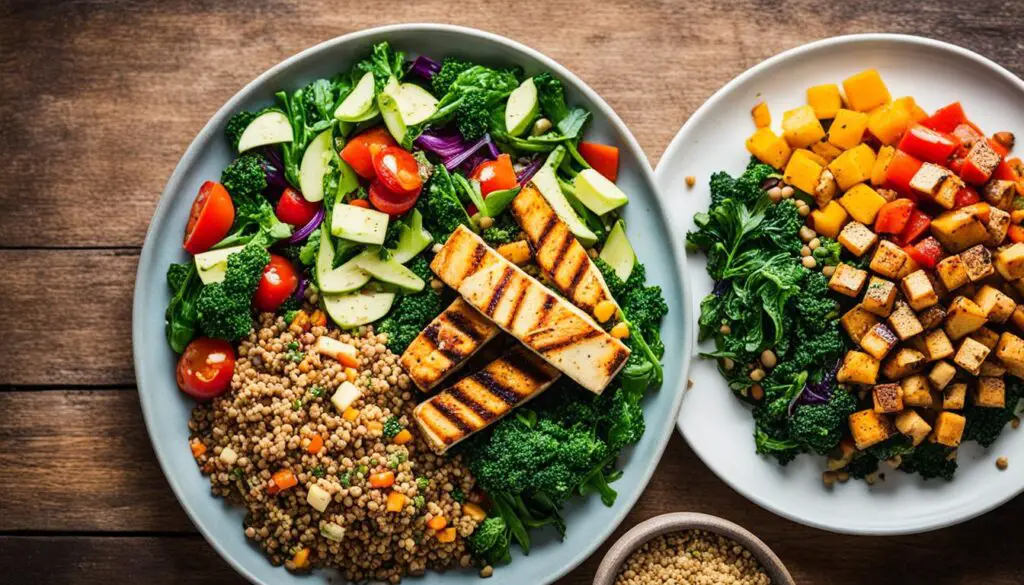
Non-vegetarians on the HCG diet typically rely on meat as their primary source of protein. However, it is crucial to choose lean and low-fat options while monitoring portion sizes to stay within the recommended calorie limits. This ensures optimal weight loss results while still receiving essential nutrients. If you’re a non-vegetarian looking to incorporate protein replacements into your HCG diet plan, consulting with a specialist is highly recommended. They can provide valuable guidance on suitable protein alternatives and offer meal preparation tips tailored to your needs.
Protein Options for Non-Vegetarians on the HCG Diet
| Protein Sources | Calories per 100g | Protein per 100g | Fat per 100g |
|---|---|---|---|
| Skinless Chicken Breast | 110 | 23.1g | 1.2g |
| Lean Turkey Breast | 104 | 21g | 1.5g |
| White Fish (Cod, Sole, Halibut) | 82 | 18g | 0.7g |
| Shrimp | 86 | 20g | 0.9g |
| Lean Beef (Sirloin, Tenderloin) | 145 | 26g | 3.5g |
Choosing lean sources of meat such as skinless chicken breast, lean turkey breast, white fish, shrimp, and lean cuts of beef can provide the necessary protein while keeping fat intake in check. Refer to the table above for approximate calorie, protein, and fat content per 100 grams of each protein source.
Remember that portion control is essential while on the HCG diet. Consult with a healthcare professional or HCG diet specialist to determine the appropriate portion sizes for your specific needs and goals.
Conclusion
The vegetarian HCG diet provides a customizable solution for weight loss, enabling vegetarians to achieve quick results. By making simple substitutions and following the recommended meal plan, vegetarians can experience rapid weight loss and increased energy. It is essential to consult with a healthcare provider and adhere to the guidelines of the HCG diet for optimal results.
References
Here are some references that provide further information on healthy vegetarian recipes and vegetarian meal ideas:
-
Vegetarian HCG Diet by awefoxonline.com
-
Can Vegetarians Do the HCG Diet? by hcgchicago.com
-
Vegetarian HCG Meal Plan for Weight Loss by chicagoweightlossclinic.com
If you’re looking for more information on vegetarian HCG diet plans or need additional healthy vegetarian recipes and meal ideas, these resources are a great starting point. They offer valuable insights and guidance to help you navigate the vegetarian HCG diet successfully.
Looking for further details or personalized advice? Contact weight loss experts who can provide targeted support tailored to your specific needs.
Additional Information
If you’re interested in learning more about the vegetarian HCG diet plan or if you need guidance and support on your weight loss journey, you can schedule a call with our team of weight loss experts. We understand that each individual has unique needs and goals, and we are dedicated to providing personalized solutions to help you achieve success.
During the call, our experts will provide you with valuable information on the vegetarian HCG diet plan, including meal ideas, tips for incorporating healthy vegetarian recipes into your routine, and ways to stay motivated throughout the process. We will address any concerns or questions you may have and work with you to create a customized plan that suits your lifestyle and preferences.
At our clinic, we are committed to your success and well-being. Our team of professionals has extensive experience in the field of weight loss, and we have helped countless individuals achieve their goals. Whether you’re looking to lose a few pounds or embark on a significant transformation, we are here to support you every step of the way.
Take the first step towards a healthier, happier you. Schedule a call with our weight loss experts to learn more about the vegetarian HCG diet plan and discover how it can benefit you. We look forward to helping you achieve your weight loss goals and improve your overall well-being.
FAQ
Can vegetarians do the HCG diet?
Yes, vegetarians can participate in the HCG diet. By making simple substitutions and following the recommended meal plan, vegetarians can achieve quick weight loss results.
What are some high-protein alternatives for vegetarians on the HCG diet?
Vegetarians on the HCG diet can maintain their protein intake through alternatives such as cottage cheese, tofu, legumes (specifically soy-based products like miso), and eggs.
What are the phases of the vegetarian HCG diet?
The vegetarian HCG diet consists of three main phases: the loading phase, the weight loss phase, and the maintenance phase.
What does the vegetarian HCG diet meal plan include?
The vegetarian HCG diet meal plan includes two servings of fruit, two servings of vegetables, one serving of protein (such as protein powder, eggs, or tofu), and allowance for beverages like tea, coffee, and water.
What are some essential groceries for the vegetarian HCG diet?
Essential groceries for the vegetarian HCG diet include high-protein alternatives such as cottage cheese, tofu, legumes (particularly soy-based products like miso), and eggs.
What can you eat on the vegetarian HCG diet?
Meals on the vegetarian HCG diet consist of one serving of protein (such as protein powder, eggs, or tofu), one serving of vegetables, and one serving of fruit. Beverages allowed on the diet include mineral water, tea, coffee, and lemon juice.
What should you do after completing the vegetarian HCG diet?
After completing the vegetarian HCG diet, it is important to ease back into a regular diet gradually and consult with a healthcare provider for guidance.
What are some protein replacements for non-vegetarians on the HCG diet?
Non-vegetarians on the HCG diet typically consume meat for protein. It is important to choose lean sources of meat and monitor portion sizes.
Can vegetarians achieve quick weight loss with the HCG diet?
Yes, the vegetarian HCG diet offers a customizable solution for weight loss, allowing vegetarians to achieve quick results by following the recommended meal plan and making appropriate substitutions.
Where can I find additional information on the vegetarian HCG diet?
For more information on the vegetarian HCG diet or other weight loss programs, individuals can consult weight loss experts who can provide personalized guidance and support.
What are some references for further reading on the vegetarian HCG diet?
Here are some references for further reading on the vegetarian HCG diet:
– “Vegetarian HCG Diet” by awefoxonline.com
– “Can Vegetarians Do the HCG Diet?” by hcgchicago.com
– “Vegetarian HCG Meal Plan for Weight Loss” by chicagoweightlossclinic.com
Where can I find additional information on healthy vegetarian recipes and meal ideas?
Individuals seeking additional information on healthy vegetarian recipes and meal ideas can explore various online resources, cookbooks, and websites dedicated to vegetarian cooking.

